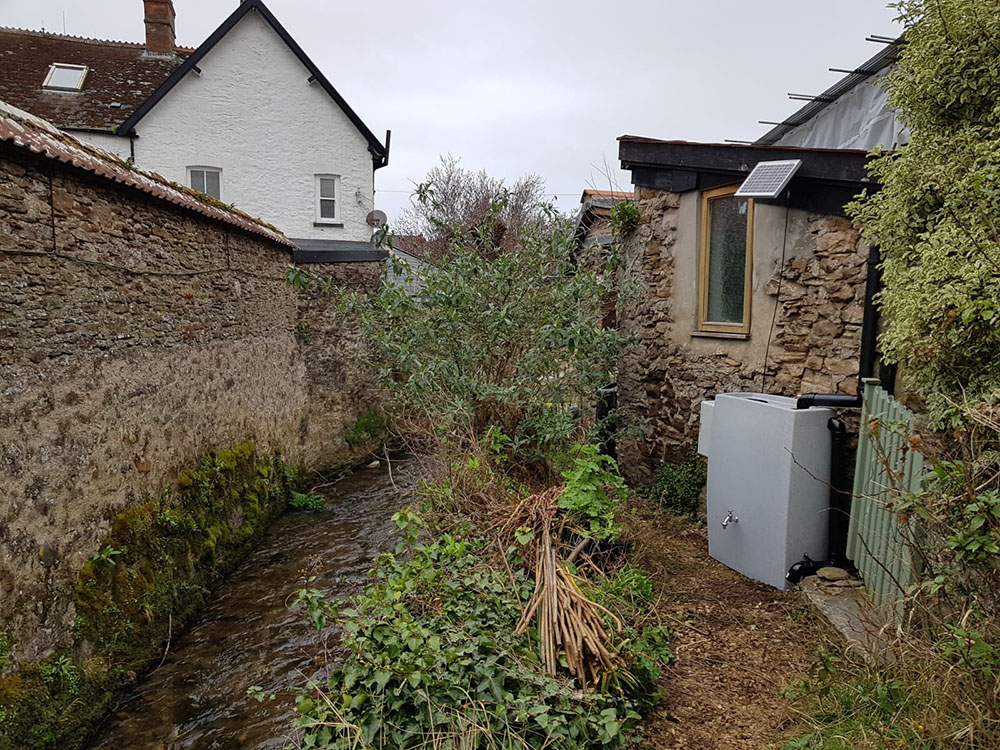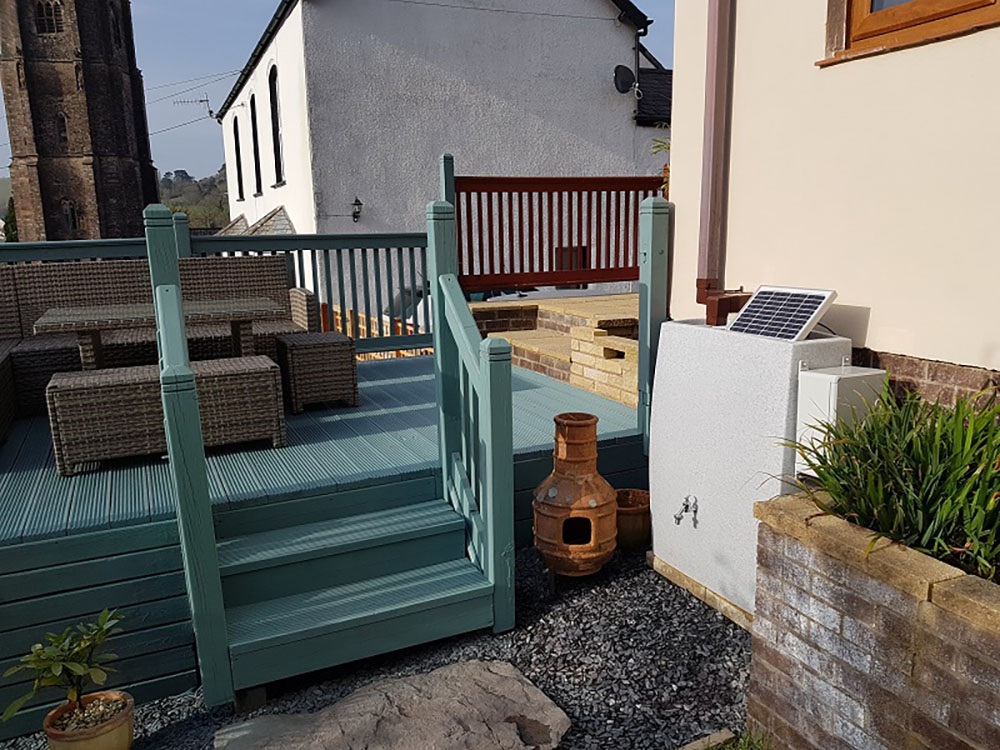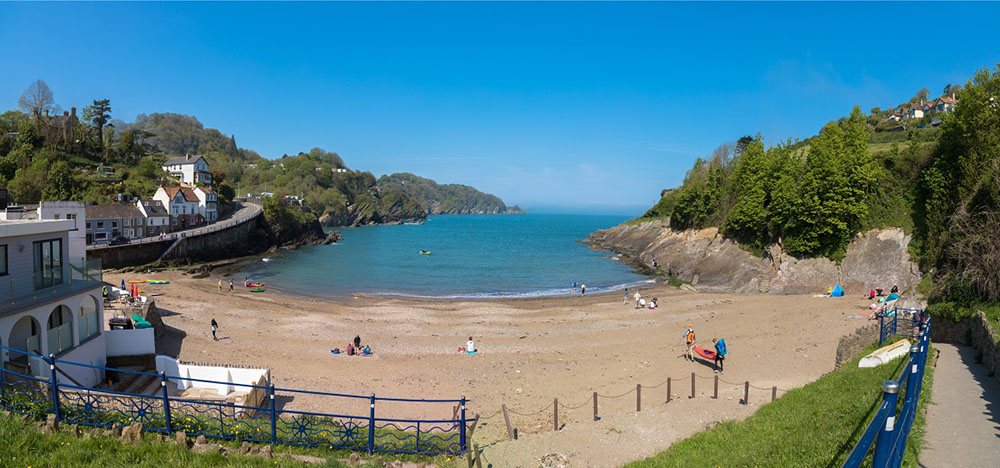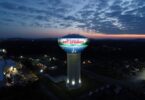South West Water has enlisted residents of a North Devon seaside village in an innovative smart rainwater collection project to investigate how a system of solar powered digitally controlled garden water butts can help manage surface water.
Engineers from South West Water and Stantec have joined forces with technologists at one of the UK’s leading smart stormwater management companies, SDS, to trial the project in the small, beach-side resort of Combe Martin. The pioneering pilot project aims to demonstrate how a distributed system that collects rain from the roofs of multiple houses can use intelligent controls to reduce the amount of surface water entering South West Water’s combined wastewater network during heavy rain.
Many wastewater networks across the country are combined systems, where runoff from impermeable surfaces such as roofs, driveways, patios and roads drain into a single system that take flows away for treatment. During heavy rainfall the flows within these systems increase significantly and can put pressure on the network triggering storm overflows to prevent flooding of homes and businesses. This pilot uses the latest technology to control flows into the network during heavy rainfall and will feed in learnings to South West Water’s wider commitment and plans to significantly reduce the use of overflows.
Early results of the project show that the 35 smart water tanks installed in the gardens of Combe Martin residents stored a total of 122,000 litres of water in the first six months of operation. It would have taken 245 average-sized water butts, without smart controls, to store the same amount of water. The collected water was available for residents to reuse for non-drinking uses like garden watering or car washing helping reduce bills and water consumption.
The SDS team recruited residents in a carefully selected catchment who volunteered to receive a free smart water tank. Fitted to a downpipe on each house, the SDS Intellistorm®-equipped smart water tanks have a slim, space-saving design and a small control box. Residents save money on their water bills by recycling the collected rainwater.

Smart Rainwater Management
Each smart water tank is controlled by a solar-powered computer which receives weather forecast data. The autonomous system is governed by an algorithm which predicts how much rain will fall and automatically adjusts the tank level to the correct capacity for the approaching storm. When information arrives that rain is due, SDS’s Intellistorm® system automatically lowers the level to free up capacity to accept the rainfall. Whilst it rains, the tanks hold back the water running off the properties’ roofs, thereby reducing the volume of water entering the combined wastewater network.
Neil Sewell, New Technology Services Director at SDS, explains: “With a combined storage capacity of more than 8,000 litres, the smart water tanks at Combe Martin provide useful attenuation capacity. However, the ground-breaking benefit of the system is its ability to make fine adjustments to the way the rainwater is discharged to help manage capacity in the network.
“Every resident will use their harvested water at a different rate, so, when rain is predicted, a level measurement is taken before emptying the water in each tank to the desired level. Each tank is positioned at a different point along the combined network to optimise network efficiency prior to the storm. Before it starts raining, the system stops releasing water and starts collecting the rain from the roof once more.
“By gathering data at a reasonably large scale, the project will enable us to quantify the benefits the tanks can provide. The fact that one smart water tank can provide the equivalent amount of water as seven traditional water butts is already a really interesting finding. It demonstrates a powerful and space-efficient way to store water and hold it back from the network.
“Projects like Combe Martin are therefore demonstrating the potential of smart, dual-purpose rainwater recycling and attenuation systems. In future, we hope they will help Water Companies to increase headroom in their networks.”

Community Engagement
As part of the pilot for South West Water, the SDS team undertook a community engagement programme to raise awareness of the project, including working with the local Water Watch Group, and recruited the householders.
South West Water’s Wastewater Asset Manager, Dave Pateman, said: “We’re pleased to be trialling this smart rainwater project in the village of Combe Martin. The technology from SDS provides an innovative approach to managing surface water, which will reduce pressure on our network during periods of heavy rainfall and help residents reduce water usage by collecting and using rainwater. We’re excited to see the results of this pilot as we continue to explore innovative ways to significantly reduce our use of storm overflows right across the region.”
Data Collection and Analysis
The Combe Martin smart rainwater project began operating in April 2021 and collected valuable data over the following 12 months initially. The SDS stormwater management system will record how much rainwater has been captured, released, reused and held back, as well as calculate the impact the system is having on volumes of water in the network. SDS will also use feedback from the project to learn how to optimise the size and control of future system designs.
It is hoped the data gathered will also demonstrate the potential of the system to be used as part of Sustainable Drainage Systems (SuDS) by other Water Companies, Local Authorities and developers.
Read more SDS Limited and Stantec Articles and News on H2O Global News. Do you have an article or video that you would like to share? Submit your article here or keep up with the latest news from the water industry and wastewater industry by subscribing to our weekly newsletter







